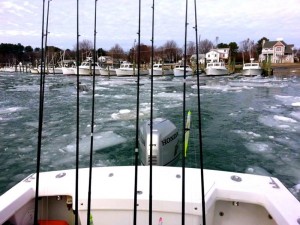striped bass
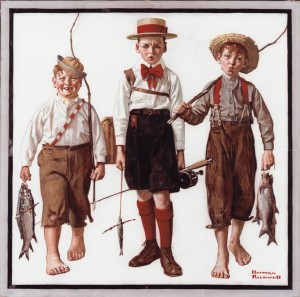 Been fishing lately? If you have, I bet you’ve noticed that there are a lot of suspended fish this time of year. There’s nothing more frustrating to Chesapeake Bay light tackle fishermen than to see nice marks on the fish finder, then not get bites. How do you catch those finicky suspended rockfish? Frankly, it’s tough, but there are some things you can do to increase your chances. To start, consider what’s going on below the surface.
Been fishing lately? If you have, I bet you’ve noticed that there are a lot of suspended fish this time of year. There’s nothing more frustrating to Chesapeake Bay light tackle fishermen than to see nice marks on the fish finder, then not get bites. How do you catch those finicky suspended rockfish? Frankly, it’s tough, but there are some things you can do to increase your chances. To start, consider what’s going on below the surface.
1. Scope Out The Situation – Stripers adjust their feeding habits depending on conditions. Since the Chesapeake Bay is an estuary, conditions can change frequently. Sometimes changes are short-term like those brought on by tides and currents. Sometimes, they last longer like with seasonal water-temperature adjustments. There are even cases where conditions can change for years at a time.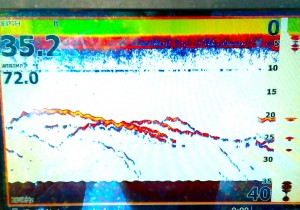
In the near-decade that I’ve been fishing the Chesapeake, I’ve noticed a change, particularly in the warmer months, to more fish feeding in temperate mid-level zones in open water. This can happen when the water conditions on the surface are not as comfortable as they are farther down. In the spring when we get a lot of rain, storm water runs off polluted roads, parking lots, fertilized lawns, and farmer’s fields resulting in a surface layer of unsalted, polluted water. Stripers will come up to feed in this layer when conditions are good and when they’re very hungry, but they’ll drop back down into the comfort zone when they aren’t extremely active. They usually won’t swim down deeper than forty feet or so because the water down deep may not hold enough oxygen, or the temperature or salinity can be uncomfortable for them. Read More!
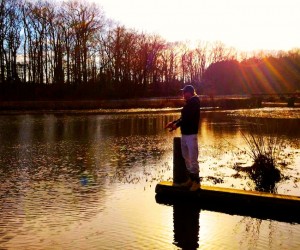 I am haunted by waters. – Norman Maclean
I am haunted by waters. – Norman Maclean
Why do you fish?
Recently, I put that question to some of the best fishermen I know, anglers with the right stuff who are continually successful. Their responses might surprise you. It isn’t a love of nature, the quest for solitude, or the thrill of the fight that drives them. Instead, they look at me with a what-kind-of-crazy-question-is-that glare and answer simply, BECAUSE I HAVE TO.
I get it. This winter has been hard on Chesapeake Bay anglers. Because of bad weather, opportunities to fish have been limited. It’s frustrating to the point of resentment. Take a look at any online discussion forum in the winter and you’ll see that some guys (and gals) take their frustrations out on their fellow anglers. Here’s what I think this frustration might look like in the format of a popular television commercial:
When you can’t fish, you get angry. When you get angry, you growl at people and animals. When you growl at animals, they growl back and you get chased by a bear. When you get chased by a bear, it shreds your pants and you hide naked in your neighbor’s garage. When you hide naked in your neighbor’s garage, her husband comes home and shoots holes in your boat. Don’t get holes shot in your boat. Go fishing. Read More!
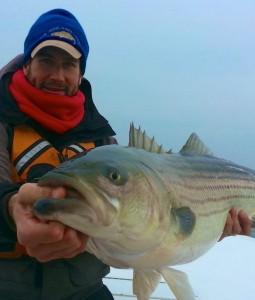 Being a good fisherman has always been about being smart enough, and humble enough to learn when given a chance. -Anthony Bourdain
Being a good fisherman has always been about being smart enough, and humble enough to learn when given a chance. -Anthony Bourdain
Actually, Bourdain never said that. Well, he did, but it was about cooking, not fishing. Some of the best fishermen I know like to cook. I guess that’s because there are a lot of similarities. I’ve recently had the opportunity to spend time with some very talented up-and-coming striper fishermen. What impresses me most is their willingness to open their minds and learn. As a result, they’re enjoying some of the best fishing experiences of their lives. That willingness to learn is a trait I’m including in a book I’m working on called, The Right Stuff.
According to the website Cookingschools.com, there are ten top qualities of a great culinary professional. As I read through them, I found it interesting how each of those qualities apply just as easily to great fishing. I hope they won’t mind if I parody their list a little by substituting fishing terms. Take a look to see if you have the recipe for a quality fishing experience. The few words I substituted are in italics.
Creativity: A great angler must be very creative and always willing to try something new. Creativity inspires a lure’s presentation, which is very important to the overall fishing experience.
Passion: A great angler has a tremendous passion for fish and fishing. They enjoy the process of selecting gear, preparing for trips, and creating lures. Read More!
That was the text message I got from my fishing partner Rich early on Super Bowl Sunday morning. It was a beautiful winter day with high temperatures expected to be in the 40s. Winds were light, skies were clear, and a new moon was pushing swift tides up the Chesapeake Bay. There was no reason to postpone our usual Sunday afternoon fishing trip, right? Well, no reason except for the 75 miles of ice clogging our waters.
It’s been a cold winter so far on the Chesapeake Bay. The Bay has frozen all the way across at the Bay Bridge on a couple of mornings and the Eastern shore has been iced in all the way up from Taylors Island to the Susquehanna Flats. The weekend warm-up had loosened up some areas, but almost all the Eastern Shore ramps were still packed in solid.
“Let’s try,” I shot back. We were suffering from serious cases of cabin fever and really wanted to go fishing. My next message went to the third member of our Sunday fishing trio, Jamie. “Any chance you can find an open ramp?” I typed. Both Jamie and Rich grew up on the Shore, and they have plenty of friends and relatives around the water. I imagined the local cellular networks were overwhelmed for a while as they called everyone they knew looking for a place to launch. A whistle from my phone alerted me to a possible plan. Jamie was forwarding pictures of an ice-free Knapps Narrows from his buddy Brian who lives on Tilghman Island. Jamie’s follow up text read, “My dad says Tilghman is always open. Those boys gotta fish.”
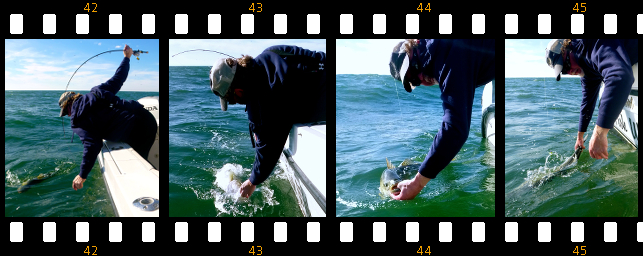 It’s winter: it’s cold, it’s wet, and it’s snowy. A lot of the ramps are iced in. It’s a great time of year to sit inside by the fire and read a book or watch a fishing video. I don’t know about you, but that keeps me entertained for about 15 minutes, then I gotta float a boat or something. Fortunately, winter is also a great time to catch and release striped bass. Rockfish are a lot more likely to survive when they’re released in cold weather. Science proves water and air temperatures greatly influence striped bass mortality. In a seminal catch & release study taken on the Susquehanna Flats in 1999, fisheries biologists Rudy Lukacovic and Ben Florence found that 98.4% of released rockfish live when they are turned loose in water temperatures of 57 to 59 degrees Fahrenheit. Stripers become more vulnerable as the weather warms and water temperatures rise, but their mortality percentage is still less than 4% in water temperatures of 62 degrees and less. Proper handling, good catch-and-release practices, and fishing in higher salinity waters can further improve catch-and-release mortality so that it’s possible to reduce the number of fish we kill to less than 1%. That makes winter a pretty awesome time to fish for those of us who are in it for the experience and not the meat. Read More!
It’s winter: it’s cold, it’s wet, and it’s snowy. A lot of the ramps are iced in. It’s a great time of year to sit inside by the fire and read a book or watch a fishing video. I don’t know about you, but that keeps me entertained for about 15 minutes, then I gotta float a boat or something. Fortunately, winter is also a great time to catch and release striped bass. Rockfish are a lot more likely to survive when they’re released in cold weather. Science proves water and air temperatures greatly influence striped bass mortality. In a seminal catch & release study taken on the Susquehanna Flats in 1999, fisheries biologists Rudy Lukacovic and Ben Florence found that 98.4% of released rockfish live when they are turned loose in water temperatures of 57 to 59 degrees Fahrenheit. Stripers become more vulnerable as the weather warms and water temperatures rise, but their mortality percentage is still less than 4% in water temperatures of 62 degrees and less. Proper handling, good catch-and-release practices, and fishing in higher salinity waters can further improve catch-and-release mortality so that it’s possible to reduce the number of fish we kill to less than 1%. That makes winter a pretty awesome time to fish for those of us who are in it for the experience and not the meat. Read More!
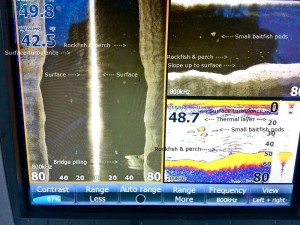 We interrupt this conservation blog with a fishing report. Nah, it’s the other way around. Chesapeake Light Tackle will always be first and foremost a fishing-report website. Well, fishing reports along with some occasional good advice about gear and techniques. Don’t worry – I won’t be lightening up on Maryland DNR’s bad decision to increase rockfish harvest by 14 percent in the face of impending cuts, but I wanted to let you know that I have been lighting up some local fishing spots lately. It’s the holidays, and the weather hasn’t been great, but there are still some fish to be caught for those who are willing to brave the elements and cast for them. The warm water discharges have been hit-and-miss lately. Most of the anglers who have visited them have been disappointed, but once in a while, I hear of a good fish or two being caught. The same goes for the deep holes at the mouths of the rivers and also for my go-to-winter honey hole: Light Tackle University (“LTU”). Read More!
We interrupt this conservation blog with a fishing report. Nah, it’s the other way around. Chesapeake Light Tackle will always be first and foremost a fishing-report website. Well, fishing reports along with some occasional good advice about gear and techniques. Don’t worry – I won’t be lightening up on Maryland DNR’s bad decision to increase rockfish harvest by 14 percent in the face of impending cuts, but I wanted to let you know that I have been lighting up some local fishing spots lately. It’s the holidays, and the weather hasn’t been great, but there are still some fish to be caught for those who are willing to brave the elements and cast for them. The warm water discharges have been hit-and-miss lately. Most of the anglers who have visited them have been disappointed, but once in a while, I hear of a good fish or two being caught. The same goes for the deep holes at the mouths of the rivers and also for my go-to-winter honey hole: Light Tackle University (“LTU”). Read More!



